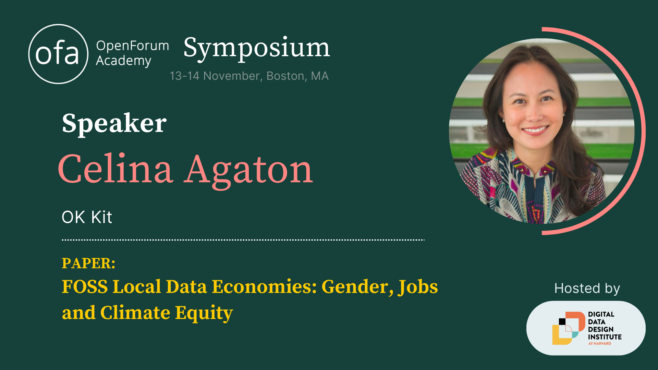
OpenForum Europe (OFE) recently invited me Boston to present my local data economy in partnership with Harvard’s new Digital Data Design Institute. OFE is a European open source software think tank that advises European policymakers and legislators on the merits of openness in computing and provides technical analysis and explanation. OFE promotes open source software, as well as openness more generally, as part of a vision to facilitate open, competitive choice for technology users.
FOSS local data economies are self-sustaining and more equitable economic, social and environmental models that meet the pace and urgency of accelerating global risks. Faster, more accurate, verifiable and representative data enable better public and private sector prioritization, coordination and monitoring across the Sustainable Development Goals (SDGs). The SDGs largely lack geospatial indicators that capture mobility, safety, proximity, infrastructure and service assessments, which accurately reflect the intersecting risks and opportunities communities experience in real-life. 78% of the 231 SDG indicators lack gender data, and despite women’s majority contributions to household and economic tasks, they have the least access to essential household and business infrastructure.
OECD reports that less than 10% of funding is received by local organizations, with 80% of climate research awarded to Western organizations over the last 30 years. Of the $137 billion invested a decade after Super Typhoon Haiyan and the Sendai Framework, only 4 percent was invested in mitigation in Asia Pacific, and the lack of coordination and tangle of overlapping multilateral efforts continues to create further chaos to already traumatized communities.
Rather than a siloed and political approach reliant on glacial grant and funding processes, local governments and cross-sector communities co-develop their own continuous and interoperable SDG map with geospatial indicators to better fast track public and private sector investments and interventions, receive the majority of budgets, and address long neglected infrastructure and the unique needs of marginalized communities.
With the exclusive use of free and open source mapping tools including unique digital twin techniques for infrastructure and disaster modelling, non-technical and technical local communities produce faster, more accurate, representative and verifiable data, at 50% lower cost and environmental footprints, while increasing local daily wages 100-900 percent, starting at 3 months. The highest wage to date is remotely trained World Bank road safety surveys at $100 per hour of work.
This an immediately viable transition to a local data economy, where local communities continuously lead data and knowledge on their community, industry and geography, to depoliticize investments, with greater governance and accountability, especially in technology, engineering and construction, which are among the most corrupt industries.
This bridges the gaps between effective policy, program development, local capacity, data and research gaps.